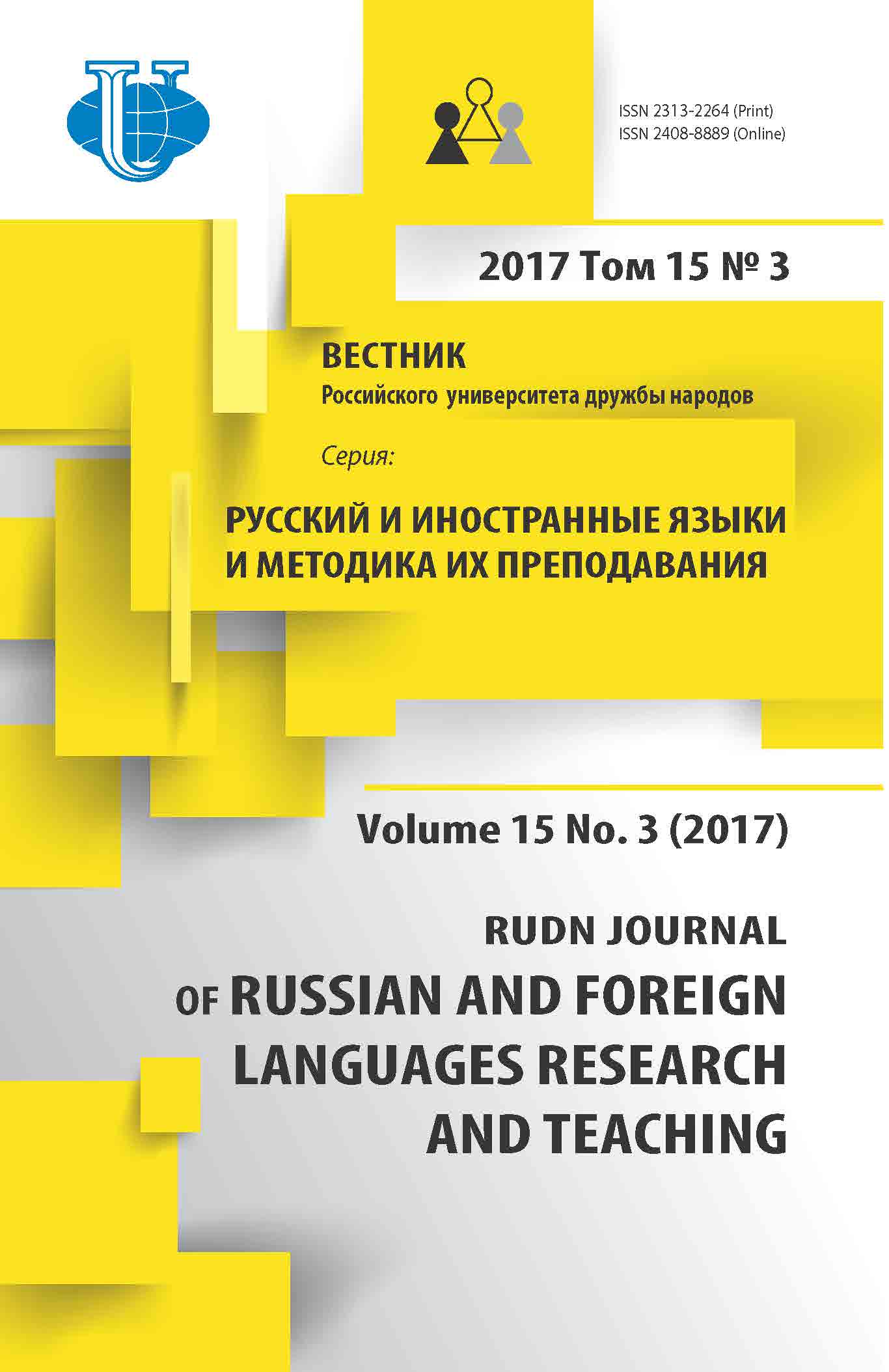PHRASEOLOGY OF THE LEARNED AND OF THE LEARNER (PROBLEMS OF THE METHODOLOGY OF MASTERING PHRASEOLOGICAL UNITS)
- Authors: Mokienko VM1
-
Affiliations:
- Saint Petersburg State University
- Issue: Vol 15, No 3 (2017)
- Pages: 333-345
- Section: Articles
- URL: https://journals.rudn.ru/russian-language-studies/article/view/16907
- DOI: https://doi.org/10.22363/2313-2264-2017-15-3-333-345
- ID: 16907
Cite item
Full Text
Abstract
In this article the problems of the methodology of mastering phraseological units are considered. The author refers to the classification of phraseological units into “natural” and “conventional” ones, proposed by the Polish researcher St. Skorupka, and proves its relevance to the methodology of teaching native and foreign languages. The need to include phraseological material in the learning process is identified and justified. Characteristic features of the use of phraseology in the process of teaching native and foreign languages are analyzed with the aim to intensify the assimilation of educational material. It is emphasized that the use of phraseological material in teaching native and foreign languages increases the interest of learners to master language and stimulates creative attitude towards it. The specificity of the phraseology of the learned and the learner and the dependence of the quantity and quality of the educational material presented on the level of knowledge of the trainees are taken into account. The “level” approach allows differentiating the appropriateness of the inclusion of phraseology in the learning process. It is no less important to take into account in this process the native language of students: for related languages, this accelerates the learning of the material more than for unrelated ones. The author of the so-called “paremiological minimum”, which is proposed by G.L. Permyakov and became popular in modern phraseology and paremiology. In principle, useful, such a minimum can not be universal for each language due to its variability and dependence on the language level of specific native speakers. In the process of teaching, the development of such a minimum requires differentiation, depending on the methodological goals set by the teacher. Based on the study, the author suggests a number of methods of teaching phraseology for different groups of students. It takes into account both domestic and foreign experience teaching phraseology.
About the authors
V M Mokienko
Saint Petersburg State University
Author for correspondence.
Email: elena-m-m@mail.ru
Valerij Mokienko, Doctor of Philology, Professor of the Department of Slavic Philology of St. Petersburg State University. University; Chairman of the phraseological commission of the International Committee of Slavists. Honored Worker of Higher Education of the Russian Federation. Sphere of scientific interests: comparative linguistics, Slavic (Czech, Ukrainian) languages, lexicology, lexicography, phraseology and phraseography, paremiology, linguoculturology, theory and practice of translation. The author of more than 1150 scientific publications, including 23 monographs and 14 textbooks and teaching aids on Russian and other Slavic languages.
Universitetskaya nab. 7-9, St. Peterburg, Russia, 199034References
- Shaklein V.M. Jetnojazykovoe videnie mira kak sostavljajushhaja lingvokul‘turnoj situacii. Vestnik Moskovskogo universiteta. Lingvistika i mezhkul‘turnaja kommunikacija. 2000. № 1. P. 73—78. (In Russ.)
- Čechová Marie Řeč o řeči. Praha: Academia, 2012. 311 p.
- Bystrova E.A. Semantizacija russkih frazeologizmov // Voprosy metodiki obuchenija russkomu jazyku uchashhihsja nacional‘noj shkoly. M.: Russkij jazyk, 1976. P. 81—90. (In Russ.)
- Birih A.K., Volkov S.S., Nikitina T.G. Slovar‘ russkoj frazeologicheskoj terminologii. Pod red. prof. V.M. Mokienko. Hsg. von A. Bierich. München: Verlag Otto Sagner, 1993. 136 p. (In Russ.)
- Vereshhagin E.M., Kostomarov V.G. Lingvostranovedcheskaja teorija slova. M.: Russkij jazyk, 1980. 416 p. (In Russ.)
- Vereshhagin E.M., Kostomarov V.G. Jazyk i kul‘tura. Tri lingvostranovedcheskie koncepcii: leksicheskogo fona, reche-povedencheskih taktik i sapientemy. M.: Izd-vo «Indrik», 2005. 1040 p. (In Russ.)
- Skorupka St. Idiomatyzmy frazeologiczne w języku polskim i ich geneza // Славянская филология. Т. 3. М.: Nauka, 1958. P. 124—155.
- Skorupka St. Z zagadnien frazeologii porownawczej // Prace Filologiczne. № 18. 1965. P. 119—130.
- Vereshhagin E.M., Kostomarov V.G. Jazyk i kul’tura. Lingvostranovedenie i prepodavanie russkogo jazyka kak inostrannogo. Izd. 3-e. M.: Russkij jazyk, 1983. 269 p. (In Russ.)
- Mokienko V.M. Slavjanskaja frazeologija. 2-e izd., ispr. i dop. M.: Vysshaja shkola, 1989. 287 p. (In Russ.)
- Komenský Jan Amos Moudrost starých Čechů, za zrcadlo vystavěna potomkům. Z rukopisu Lesenského // Spisy Jana Amosa Komenského. Vydal Jan Novák. Číslo 2. Praha, 1901. 113 p.
- Mokienko V.M., Štěpánova L. Ruská frazeologie pro Čechy. Русская фразеология для чехов. 2. vydání (rozšířené). Olomouc: Univerzita Palackého v Olomouci, filozofická fakulta, 2008. 259 p.
- Mokienko V.M. O tematiko-ideograficheskoj klassifikacii frazeologizmov // Slovari i lingvostranovedenie / Pod red. E.M. Vereshhagina. M.: Russkij jazyk, 1982. P. 108—121. (In Russ.)
- Jarancev R.I., Stepanova L.I. Uchebnoe posobie po russko-cheshskoj frazeologii (Razdel „Jemocii i chuvstva cheloveka”). M.: Izd-vo Mosk. un-ta, 1989. 169 p. (In Russ.)
- Jarancev R.I., Stepanova L.I. Russko-cheshskaja frazeologija (Svojstva i kachestva haraktera). M.: Izd-vo Mosk. un-ta, 1992. 96 p. (In Russ.)
- Wotjak B., Richter M. Sage und schreibe. Deutsche Phraseologismen in Theorie und Praxis. Leipzig-Berlin-München: Langenscheidt, 1994. 150 p.
- Felicyna V.P., Mokienko V.M. Russkie frazeologizmy. Lingvostranovedcheskij slovar’. Pod red. E.M. Vereshhagina i V.G. Kostomarova. M.: Russkij jazyk, 1990. 222 p. (In Russ.)
- Mokienko V.M. Paremiologicheskij minimum i paremiologicheskie maksimy sovremennoj russkoj zhizni // Slova. Koncepty. Mify. K 60-letiju Anatolija Fjodorovicha Zhuravljova / Otv. red. G.K. Venediktov. M.: Izd-vo «Indrik», 2011. P. 218—231. (In Russ.)
- Kaznyshkina I.V. Kommunikativnyj podhod k otboru frazeologicheskogo materiala dlja kratkosrochnyh kursov russkogo jazyka. Avtoref. diss. ... kand. filol. nauk. L., 1985. 14 p. (In Russ.)
- Jakimenko N.E. Obuchenie inostrannyh studentov-filologov III kursa ponimaniju frazeologizmov v hudozhestvennom tekste. Avtoref. diss. ... kand. filol. nauk. L., 1990. 16 p. (In Russ.)
- Guzina O.S Leksicheskij aspekt sovershenstvovanija ustnoj rechi mongol’skih studentov-filologov (na materiale frazeologii). Avtoref. diss. ... kand. filol. nauk. SPb., 1992. 18 p. (In Russ.)
Supplementary files














